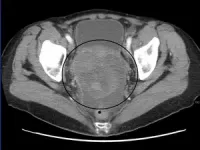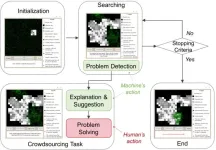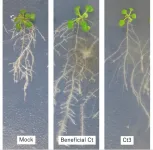(Press-News.org) For the 314,000 people diagnosed with ovarian cancer each year, hope often comes in the form of platinum-based drugs such as cisplatin.
Cisplatin causes the death of quick-dividing tumour cells, so it is a potent first-line defence in the treatment of the often fatal disease.
However, over half of ovarian cancer patients develop recurrence and become resistant to cisplatin and other platinum-based chemotherapies, contributing to the five-year survival rate of 31%.
It is unclear why this resistance occurs, but a solution is urgently needed.
In a recent study published in the journal Cancer Gene Therapy, a team of researchers from China and the UK were able to reduce the growth of cisplatin-resistant tumours in female mice by decreasing the activity of a gene called superoxide dismutase 1 (SOD1).
SOD1 is an important tool in the body's attempts to protect itself and reduce cell damage. However, in some cases, SOD1 levels may become too high and be detrimental.
SOD1 off!
The study extends previous work on ovarian cancer cells that showed cisplatin-resistant tumour cells had high levels of SOD1 as a result of damage induced by cisplatin treatment side effects. The results suggested that reducing SOD1 levels can stop cells from becoming resistant to the chemotherapeutic drug.
The use of small-interfering RNA (siRNA), a class of molecules that can control the expression of genes, can decrease SOD1 expression levels. However, the delivery of siRNA into the body has several problems as it degrades quickly and is unable to reach its target before the kidneys filter it out.
In this latest research, the team developed a method using nanoparticles to deliver siRNA to the target tumour tissue in mice without it being degraded so quickly.
The results showed that when the siRNA was successfully transported and released into tumour tissue six times over 14 days in female mice, the tumour showed reduced growth and decreased resistance to cisplatin.
Therefore, the researchers confirmed SOD1 as a suitable target for overcoming cisplatin resistance.
Professor Mu Wang, from Xi'an Jiaotong-Liverpool University, China, and the corresponding author of the paper, says: "Compared with the control group of mice that did not receive the injection of nanoparticles with siRNA, the mice that received two doses had enhanced sensitivity to cisplatin treatment without obvious physiological toxicity."
Targeting delivery
To deliver the siRNA to the tumour tissue, the team injected female mice with nanoparticles made out of graphene oxide. The siRNA was contained within the nanoparticles, which have been successful as siRNA carriers in other studies.
In this work, however, the graphene oxide nanoparticles caused some toxicity and liver damage in the mice. The nanoparticles also undid some of the positive effects of using siRNA to reduce SOD1 levels, as the nanoparticles themselves caused an increase in SOD1.
The researchers were able to decrease some of the toxicity by modifying the nanoparticles.
Now that the team have identified the potential of targeting SOD1 to reduce cisplatin resistance and shown that the siRNA for SOD1 itself has limited toxicity, they will continue to investigate the full extent of reducing SOD1 levels and explore other siRNA delivery methods to carry it to the targeted tumour tissue.
Professor Wang says: "We hope this result will provide new ideas and important scientific references for clinical exploration to overcome tumour cisplatin resistance and the drug resistance problem that has plagued ovarian cancer chemotherapy for a long time will hopefully be resolved."
END
Potential target for reversing drug resistance in ovarian cancer identified
A team from China and the UK have reduced the growth of cisplatin-resistant tumours in female mice by decreasing the activity of a gene called superoxide dismutase 1 (SOD1).
2023-09-06
ELSE PRESS RELEASES FROM THIS DATE:
Human-AI collaboration improves source search outcomes
2023-09-06
When artificial intelligence robots that have been designed to use algorithms to complete source search tasks, such as search and rescue operations during a fire, encounter a disturbance, they are often unable to complete their task. Proposed solutions have ranged from trying to improve algorithms to introducing additional robots, but these AI-driven robots still encounter fatal problems.
Researchers have proposed a solution: a human-AI collaboration that takes advantages of the unique skills of the human brain to overcome challenges.
The paper was published in the Journal of Social ...
Teleneurology challenges met by training curriculum
2023-09-06
A new physician-training system in telehealth simulates key parts of traditional, in-person neurological exams that use little reflex hammers, pinpricks, and flashlights to test nerve function. The three-year program, which was designed by researchers at NYU Grossman School of Medicine, has trained at least 68 neurology residents since its rollout in 2020. Published online Aug. 3 in Neurology Education, a new analysis of the curriculum identifies challenges to translating in-person exam techniques ...
A secret for boosting hotel bookings: analyze online user reviews for your hotel and your competitors
2023-09-06
Researchers from Texas Christian University, University of South Carolina, and RealPage published a new Journal of Marketing article that examines the impact of online reviews on hotel booking performance with a specific focus on the competitive effects of reviews.
The study, forthcoming in the Journal of Marketing, is titled “The Competitive Effects of Online Reviews on Hotel Demand” and is authored by Sanghoon Cho, Pelin Pekgun, Ramkumar Janakiraman, and Jian Wang.
Recent reports indicate that a majority of consumers trust online reviews as much as personal recommendations when deciding to book a hotel. A 2019 study ...
Rubber plumbing seals can leak additives into drinking water, study says
2023-09-06
As drinking water flows through pipes and into a glass, it runs against the rubber seals inside some plumbing devices. These parts contain additives that contribute to their flexibility and durability, but these potentially harmful compounds can leak into drinking water, according to a small-scale study in ACS’ Environmental Science & Technology Letters. The authors report that the released compounds, which are typically linked to tire pollution, also transformed into other unwanted byproducts.
To enhance rubber’s strength and durability, manufacturers typically mix in additives. Scientists have shown that tire dust ...
Mount Sinai announces partnership with the Brazilian Clinical Research Institute to advance cardiovascular disease research and medical education
2023-09-06
The Icahn School of Medicine at Mount Sinai announced today that it has signed a memorandum of understanding with the Brazilian Clinical Research Institute (BCRI) to focus on advancing cardiovascular disease research, innovation, and medical education.
"This partnership is part of a broader initiative to expand Mount Sinai Heart’s reach globally, and Latin America is an important part of that goal," said Deepak L. Bhatt, MD, MPH, Director of Mount Sinai Heart and Dr. Valentin Fuster Professor of Cardiovascular Medicine at Icahn Mount Sinai. "Our partnership ...
Recent advances in melon and gourd research
2023-09-06
As summer draws to a close, the long vines and tendrils of most melons and gourds in the Cucurbitaceae family snake their way along the ground. And they’re dotted with fruits, such as cucumbers or pumpkins. Below are some recent papers published in ACS journals that report insights into melons’ potential health impacts, pathogens and contaminants. Reporters can request free access to these papers by emailing newsroom@acs.org.
“Nanoparticles Loaded with a Carotenoid-Rich Extract from Cantaloupe Melon Improved Hepatic Retinol Levels in a Diet-Induced Obesity Preclinical Model”
ACS ...
Broad Institute of MIT and Harvard announces a new research alliance with Novo Nordisk to identify therapeutic targets for type 2 diabetes and cardiometabolic diseases
2023-09-06
Cambridge, MA (September 6, 2023) — The Broad Institute of MIT and Harvard today announced a new research alliance with Novo Nordisk aimed at addressing critical unmet clinical needs in diabetes and cardiometabolic diseases. The collaboration will focus on advancing three programs over the next three years. Two programs aim to identify drug targets for clinically important subtypes of type 2 diabetes, which affects more than 37 million people in the United States alone, and one program aims to unravel the genetic roots of cardiac fibrosis, or scarring of the heart, which occurs in many cardiovascular diseases that can lead to ...
MD Anderson and Panacea launch Manaolana Oncology to develop antibody-based therapies for cancer
2023-09-06
HOUSTON and SAN MATEO, Calif. ― The University of Texas MD Anderson Cancer Center and Panacea Venture today announced the launch of Manaolana Oncology Inc., a new company created to develop and advance antibody-based therapies against novel cancer antigens.
Manaolana Oncology seeks to build upon the innovative antibody production capabilities and intellectual property of MD Anderson to research and develop novel monoclonal antibodies (mAbs) and other antibody-based therapies for a variety of cancer types, with the goal of advancing promising therapies into ...
Obesity-related cardiovascular disease deaths tripled between 1999 and 2020
2023-09-06
Research Highlights:
Obesity-related cardiovascular disease deaths tripled between 1999 and 2020 in the U.S.
Such deaths were higher among Black individuals (highest among Black women) compared with any other racial group, followed by American Indian/Alaska Native people.
Black adults who lived in urban communities experienced more obesity-related cardiovascular disease deaths than those living in rural areas, whereas the reverse was true for all other racial groups.
This news release has been updated to include ...
Switching from harmful to helpful fungi
2023-09-06
Mold and diseases caused by fungi can greatly impact the shelf life of fruit and vegetables. However, some fungi benefit their hosts by aiding plant survival. Colletotrichum tofieldiae (Ct) is a root mold which typically supports continued plant development even when the plant is starved of phosphorus, an important nutrient for photosynthesis and growth. Researchers studied a unique pathogenic strain of the fungi, called Ct3, which conversely inhibits plant growth. By comparing the beneficial and harmful strains Ct strains, they found that activation of a single fungal secondary metabolism gene cluster determined the negative impact of the fungus on the host ...
LAST 30 PRESS RELEASES:
Rediscovered music may never sound the same twice, according to new Surrey study
Ochsner Baton Rouge expands specialty physicians and providers at area clinics and O’Neal hospital
New strategies aim at HIV’s last strongholds
Ambitious climate policy ensures reduction of CO2 emissions
Frontiers in Science Deep Dive webinar series: How bacteria can reclaim lost energy, nutrients, and clean water from wastewater
UMaine researcher develops model to protect freshwater fish worldwide from extinction
Illinois and UChicago physicists develop a new method to measure the expansion rate of the universe
Pathway to residency program helps kids and the pediatrician shortage
How the color of a theater affects sound perception
Ensuring smartphones have not been tampered with
Overdiagnosis of papillary thyroid cancer
Association of dual eligibility and medicare type with quality of postacute care after stroke
Shine a light, build a crystal
AI-powered platform accelerates discovery of new mRNA delivery materials
Quantum effect could power the next generation of battery-free devices
New research finds heart health benefits in combining mango and avocado daily
New research finds peanut butter consumption builds muscle power in older adults
Study identifies aging-associated mitochondrial circular RNAs
The brain’s primitive ‘fear center’ is actually a sophisticated mediator
Brain Healthy Campus Collaborative announces winner of first-ever Brain Health Prize
Tokyo Bay’s night lights reveal hidden boundaries between species
As worms and jellyfish wriggle, new AI tools track their neurons
ATG14 identified as a central guardian against liver injury and fibrosis
Research identifies blind spots in AI medical triage
$9M for exploring the fundamental limits of entangled quantum sensor networks
Study shows marine plastic pollution alters octopus predator-prey encounters
Night lights can structure ecosystems
A parasitic origin for the ribosome?
A gold-standard survey of the American mood
Tool for identifying children at risk of speech disorders
[Press-News.org] Potential target for reversing drug resistance in ovarian cancer identifiedA team from China and the UK have reduced the growth of cisplatin-resistant tumours in female mice by decreasing the activity of a gene called superoxide dismutase 1 (SOD1).




